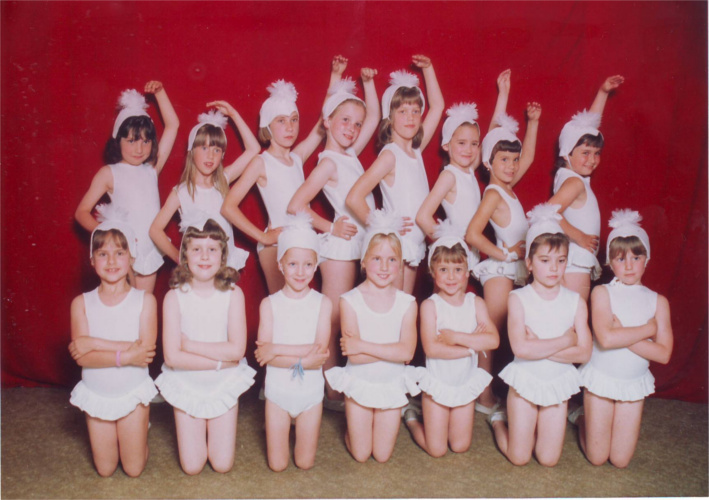As a child I was enrolled in music lessons, after-school art classes, swimming, ballet and ballroom dancing lessons, and math and chemistry coaching for competitions. My parents would sign me up for anything I showed interest in. We had season tickets to the opera, the ballet and the symphony. From age 10 to 18 I went to a prestigious school operated by the university I later attended. My school friends are now scientists, doctors and business people. During the summer my family would go on vacations every year. My parents and grandparents owned a cottage by a lake where I was welcome to invite my friends to spend a week, during which my parents would baby-sit us all. Almost every winter I went skiing for a week with my family or my school. I attended the best undergraduate program in the country for pure math.
As a child I longed for salami and sausages as if they were foods reserved for royalty. My mom would usually run out of ‘kitchen money’ a week or so before pay day, and there would be a sign inside the fridge saying “These are all the eggs until the 10th! Only use in emergencies!“. My brother and I would joke about what exactly constituted an “egg emergency”. My family went out to a restaurant once a year. I shared a room with my sister growing up, and by North-American standards our house didn’t have a living room. My big childhood dream was to one day own a couch. My parents and grandparents built the house and the cottage mostly by hand, while also working full time. We didn’t have a car until I was 10 or a phone line until I was 13. On our 3-week family vacation to Italy, my siblings and I were treated to ice cream once.
The strange dichotomy of rich and not so rich partially reflects my parents’ values. My mom couldn’t take piano lessons as a child and so she had sworn to always nurture whatever intellectual, artistic or athletic interests we had. The only thing she couldn’t afford to get for us was horseback riding lessons, and I think she felt really bad about it (we did get a short trial course). On the other hand I don’t think she shed many tears of remorse over denying me that meal at McDonald’s that I so badly desired, or denying us ice cream on vacation in favour of museum tickets.
I have a particularly fond memory from when I was around 16 or 17, which shows how supportive and resourceful my parents were. A group of my friends came over to our house to prepare together for a math competition. We were solving problems, talking, teasing each other, having a great time. In a couple of hours we got hungry, and this being a few days before pay day my family barely had any food at home. There was always a stash of a few hundred kilos of potatoes in the cellar though, so my dad brought a large sack of those in and my mom started making French fries. We ate batch after batch of fries, late into the night; my mom must have spent at least six hours peeling and frying potatoes. Then we slept in sleeping bags spread out on the floor of my room – it was the best.
The cultural and educational wealth of my youth wasn’t all a matter of my parents’ preferences, though: I grew up in Eastern Europe around the fall of communism. High quality education, extracurricular activities and cultural events weren’t the luxury items that they are today in the US, Canada and Australia. University was free, and I even got an academic scholarship – pocket money, but still. The quality of the schools I went to had much less to do with my parents’ means and more to do with the academic encouragement they provided, which lead to my passing the entrance exams. Extra math and chemistry sessions at my school were free. Dance, art and swimming were eminently affordable. Horseback riding was expensive, but I could have done it for free had I been willing to commit to pentathlon – the catch was that my first year of training would have been spent running, which I found distinctly unappealing.
Looking back, I wouldn’t change a thing. Being encouraged academically by my parents and highly qualified, dedicated teachers has resulted in a career I love. The dance lessons I had as a child were the foundation for a hobby that has shaped my life in a significant way, and transformed me from an awkward chubby teenager into an athletic adult who takes pleasure in movement. Going to a special 8-year high school program has given me life-long friendships. Even the music lessons, which were arguably wasted on little tone-deaf me, helped develop skills to understand and appreciate music as a listener. Not being taken out to restaurants as a child? I had horrific taste in food at the time anyway; I don’t think I missed out on much. And I still have a few decades to eat all the salami I want and enjoy owning a couch.
Preparing for the arrival of our first child I wonder how I will live up to the memories of my own wealthy poor childhood. I would say I’m going through a bout of strange, late-onset culture shock. It’s easy to imagine how we will provide our kid(s) with all the things I didn’t have: undoubtedly they will have access to eggs even for non-emergencies. I am somewhat confident that they will each have their own room one day, and this is perhaps the one moderately important thing that my parents couldn’t provide: to this day I’m not comfortable sleeping in a room by myself. Our kids will travel the world – a necessity given our spread out family and academic careers – and they will be treated to ice cream on hot summer days, even when abroad. Even in the “West”!
In contrast, all the things I had taken for granted as a child seem appallingly expensive or even completely out of reach. Health insurance and child care in Australia is priced roughly at the child’s weight in gold. I have no idea in which country our kids will go to school, but take the US for example: there is a direct correlation between the quality of public schools and real estate prices. Want your kid to enjoy school? No problem, all you need to do is buy a million-dollar house. The cost of extra-curricular activities varies widely based on what the child is interested in: some things cost a fortune at any level, and most things cost a fortune at a sufficiently high level. Not to mention the price tag on supporting a child through university, but maybe one should not worry about problems 20 years down the line.
At the end of the day, I hope our children’s childhoods will be a lot like mine had been. Every Sunday my family sat down for a big lunch together, though most of you would probably call these meals dinners: they were the main meal of the day and often didn’t happen until 3 or 4 pm. My mom would make our favourite meals, like schnitzel with French fries, and no matter how much she made we would fight over the fries. We’d sit around eating and laughing for hours, and eventually my sister would pipe up, in a little mousy voice: “dessert?” Some Sundays there was something already in the oven, otherwise she and I would just keep squeaking “dessert?” every minute or so, until my dad – usually on the verge of dosing off at the table – would groan and say “Ok, ok, I’ll bake a cherry pie”.
Share your childhood stories and insight in the comments! Also, is it bad news that the aspect of parenting I most look forward to is spoiling the kid with baked goods?


I feel the same way. My parents homeschooled me, and now that my son is getting closer to school age, I’m remembering a lot of the same sorts of things that you are talking about. I think my parents bartered for a lot of the tutoring, dance lessons, and other activities that I got to participate in. And we didn’t go out to eat — except for ice cream on Fridays. So I had you beat there 🙂
Hi Brie, I’m sorry I respond so late, but thank you for sharing this! It sounds like you had a wonderful childhood. Homeschooling must be a huge commitment, but I’d like to believe that at the end of the day what we value goes a long way, even if it’s public school and activities on a budget :).